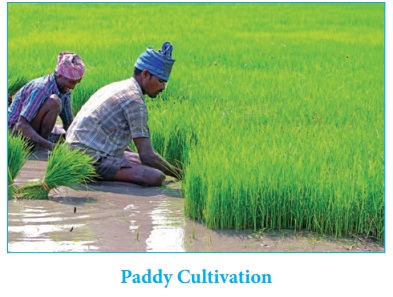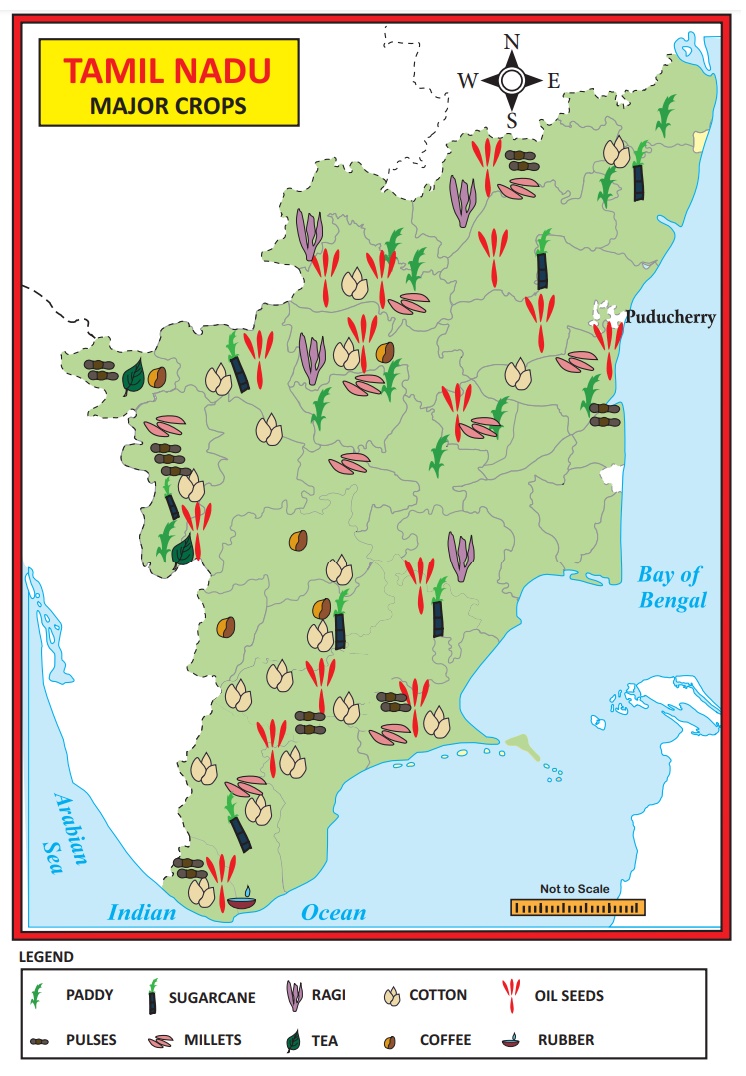Human Geography of Tamil Nadu - Distribution of major crops in Tamil Nadu | 10th Social Science : Geography : Chapter 8 : Human Geography of Tamil Nadu
Chapter: 10th Social Science : Geography : Chapter 8 : Human Geography of Tamil Nadu
Distribution of major crops in Tamil Nadu
Distribution of major crops in Tamil Nadu
Paddy
Paddy is
the most important staple food crop of Tamil Nadu. Ponni and kichadi samba are
the major varieties of paddy grown in Tamil Nadu. Though it is cultivated all
over Tamil Nadu, its cultivation is highly concentrated in Thanjavur, Tiruvarur,
Tiruvallur, Kancheepuram, Villupuram, Cuddalore and Tirunelveli districts. It
ranks third in the production of rice among the states of India. The deltaic
region of river cauvery (the undivided Thanjavur district) is the major
rice-producing region of Tamil Nadu. So, this region is rightly called as the "Granary of Tamil Nadu."

The Tamil Nadu Rice Research Institute (TRRI) is an Indian
research institute working in the field of rice under Tamil Nadu Agricultural University
(TNAU).It is situated at Aduthurai, in Thanjavur district, it was established
in April, 1985 in TNAU to meet the research requirements of the region with the
help of existing Agricultural Colleges and Research centres and perform lead
function for rice and rice based cropping system research.
Millets
Millets
form staple food of nearly one-third of human population of Tamil Nadu.
Sorghum/jowar (cholam), ragi (kezhvaragu) and bajra (kambu) are the major
millets. These are grown not only in drier areas but also in the coastal
plains. Sorghum is grown in the Coimbatore plateau and Kambam valley. Ragi is
grown in Coimbatore, Dharmapuri, Vellore and Cuddalore districts. Bajra is
mostly cultivated in Ramanathapuram, Tirunelveli, Karur, Perambalur and Salem districts.
India observed 2018 as national year of millets. FAO has decided
to observe 2023 as the International year of millets.
Pulses
Pulses
are the major source of protein. Bengal gram, black gram, green gram, cowpea
and horse gram are the important pulses grown in Tamil Nadu. Pulses are grown
in a wide range of climatic conditions mostly in drier regions with or without
irrigation. Mild cool climate and a low to moderate rainfall are best suited
for these crops. Pulses serve as excellent fodder. Pulses are grown in almost
all districts in the state except Chennai, Nilgiris and Kanyakumari. Coimbatore
leads in the production of Bengal gram. Vellore and Kanyakumari districts
produce red gram.
Tiruvarur,
Nagapattinam and Thoothukudi districts are the principal producers of green
gram and black gram. Horse gram is widely cultivated in Dharmapuri and
Krishnagiri districts.
Oil Seeds
Groundnut,
gingelly castor, coconut, sunflower and mustard are some of the oilseeds that
are grown in Tamil Nadu. Apart from its use in food preparation, it is used in
industries as a lubricant, in the manufacture of varnish, soaps, candles,
cosmetics and pharmaceuticals. Groundnut is the major oilseed of the state. The
cultivation of groundnut is mostly concentrated in Vellore, Tiruvannamalai,
Villupuram, Salem and Pudukottai districts. It is also grown to some extent in
Dharmapuri, Cuddalore, Perambalur and Madurai. Erode, Ramanathapuram,
Sivagangai and Virudhunagar districts are its minor producers. Coconut is grown
in Coimbatore, Thanjavur and Kanyakumari districts.
Second Green Revolution (Eco-Farming or Organic Farming)
In organic farming synthetic fertilizers, pesticides, growth
regulator and livestock feed additives are not used. This type of farming rely
on crop rotation, crop residues, animal manure, off-farm organic wastes and
biological pest control to maintain soil productivity. This farming method is
being adopted by very few farmers in the state.
Sugarcane
It is one
of the major cash crops of the state. It is an annual crop. It requires high
temperature and heavy rainfall. It grows well in the tropical region. Major
sugarcane-producing districts are Tiruvallur, Kancheepuram, Vellore, Cuddalore,
Tiruchirapalli, Coimbatore, Erode and Tirunelveli.
Cotton
Cotton is a fibre and cash crop. It requires black soil, long frost-free condition and warm and humid weather for its cultivation. Humid weather in the early stages and hot, dry weather during harvest period is suitable for this crop. It is predominantly cultivated in Coimbatore plateau and Vaigai-Vaippar river basins. It is also cultivated in Madurai, Ramanathapuram, Virudhunagar, Tirunelveli, Thoothukudi, Salem and Dharmapuri districts.
TANTEA (TANTEA-Tamil Nadu Tea Plantation Corporation Limited) is
one of the Biggest Black Tea Producers in India with high quality clonal tea.
Its plantation spreads over nearly 4500 hec.
Plantation crops
Tea,
coffee, cashew, rubber and cinchona are the major plantation crops of the
state. Tamil Nadu ranks second in area and production of tea in India next to
Assam. Tea plantations are found in the hills of the Nilgiris and Coimbatore.
The Nilgiris is the notable regions for tea plantations. Coffee plants are
grown in the hills of Western Ghats as well as Eastern Ghats. It is also found
in the hilly slopes of Dindigul, Madurai, Theni and Salem districts. Yercaud,
Kolli Hills and Kodaikanal are notable for coffee plantations. Tamil Nadu
stands second in area and production of coffee next to Karnataka. Rubber
plantations are significant in Kanyakumari. Pepper is confined to the warm and
wet slopes of Eastern and Western Ghats of Tamil Nadu. Cashew is extensively
cultivated in Cuddalore district.
To promote organic farming a central scheme named ‘National
Project on Organic Farming’ was launched Apart from general things (creating
awareness, promoting organic fertilizers, training, capacity building etc.),
the scheme provides financial assistance through Capital Investment Subsidy
Scheme for agro-waste compost production units, bio-fertilizers/bio-pesticides
production units, development and implementation of quality control regime,
human resource development etc.

Related Topics